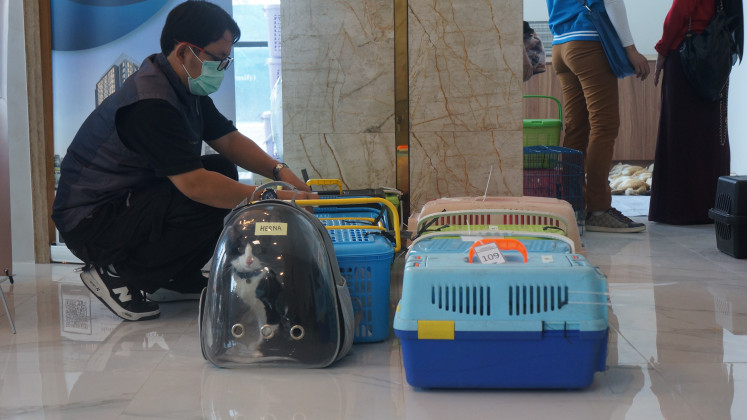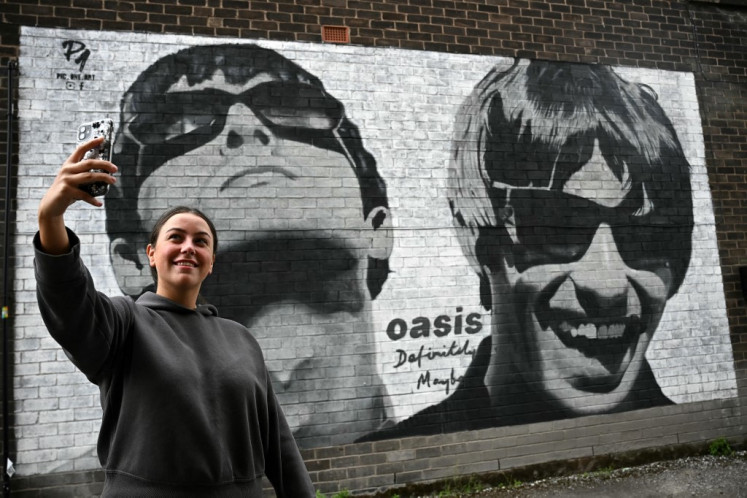Popular Reads
Top Results
Can't find what you're looking for?
View all search resultsPopular Reads
Top Results
Can't find what you're looking for?
View all search resultsMore support needed for rape victims
Society and the government need to be kinder and more supportive to rape survivors.
Change text size
Gift Premium Articles
to Anyone
 Rape is a forceful sexual attempt through violence that causes trauma to its victim. (Shutterstock/File)
Rape is a forceful sexual attempt through violence that causes trauma to its victim. (Shutterstock/File)
Did you know that in Indonesia, every day, more than 35 women are victims of sexual violence?
Sexual violence occurs at home behind closed doors, the workplace, schools and other public areas. The National Commission on Violence Against Women (Komnas Perempuan) noted that in 2017 sexual violence was the most common form of violence in the public domain with more than 2,500 cases. The three most common types of sexual violence are harassment, abuse and rape.
In a note on 15 forms of sexual violence, Komnas Perempuan wrote that rape was an attack in the form of coercion of sexual relations by using the penis toward the vagina, anus or mouth of the victim. Coercion can also happen with fingers or other objects. This attack is carried out by violence, a threat of violence, psychological pressure, abuse of power or by taking advantage of a coercive environment.
Rape is a traumatic event, an event that is psychologically interpreted as a mental experience that threatens life and surpasses the average person's capacity to bear it. A traumatic experience can cause drastic changes in a person's life, including changes in perception of life, behavior and emotional well-being. Rape disturbs the well-being of its victim; thus, they need an array of services comprising legal, medical (including mental health) and social services. The interaction between a rape victim and different systems impacts the recovery process.
Read also: How I went from being a rape victim to a survivor
A sexual assault victim needs immediate medical attention. These include careful assessment and management of any physical injuries, medical forensic examination, screening and treatment for sexually transmitted diseases (including HIV) and emergency contraception methods. Such services are provided by community health centers and general hospitals. In addition to medical care, rape victims also require psychological intervention with so-called "psychological first aid". Psychological intervention is essential to promote and accelerate recovery of sexual violence victims.
Read also: How I went from being a rape victim to a survivor
Rape almost certainly causes mental distress. Changes in perception of oneself and one's world require extraordinary adaptation so that individuals can continue their lives. Symptoms of mental distress that may be found in rape victims include fear, insomnia, nightmares or excessive alertness. These are normal psychological responses to an abnormal event. These symptoms may slowly disappear and get better in around six weeks period as part of the normal adjustment process. To adapt, rape victims may try to go about their lives as normally as possible, get back to the usual routine, talk about what they trust, do relaxation exercises, eat and exercise regularly, as well as spend some time with family and friends.
The reaction of a rape victim to the events varies depending on their personality traits, the established social support and the response from the community or the prevailing cultural values. Rape victims will go through the stages of mental response known as five stages of grief. Kubler-Ross describes this phase as a phase of shock and denial, anger, bargaining, desperation and acceptance. Generally, these five stages take place sequentially, although in some people it can occur otherwise. The length of time a person spends at each stage can vary, and there is no specific benchmark to determine how long it will take to reach the acceptance stage. Psychological assistance services are needed to help rape victims reach the stage of acceptance.
Recent studies in Western countries suggest that 16 to 60 percent of rape victims get mental health services following the incident. This service includes mentoring, counseling, support groups and mediation. Generally, mental health services are provided to help rape victims feel comfortable; therefore they are less hesitant to disclose issues pertaining to their violent experiences. Counseling is also expected to strengthen emotional resilience and help victims so that they feel empowered to make decisions and necessary choices.
Rape victims, as well as other trauma victims, need prompt and appropriate treatment. The purpose of providing treatment is to prevent severe physical and psychological distress. One of the efforts of the Indonesian government in meeting the needs of rape victims is by establishing the Integrated Women’s and Children’s Center (P2TP2A). The most common form of service is an integrated crisis center spread across various government-owned health centers and hospitals.
In the community, attempts to help rape victims recover consist of legal certainty, provision of safe houses, home visits to get support from families and surrounding communities and educational activities. Another need is the provision of adequate information about sexual violence. Mass media plays an important role in educating the public and providing support for victims of violence. The mass media should be able to write facts-based information, deconstructing the myths, understanding complex issues and publicizing resources to help rape victims.
Read also: Treat rape victim as victim
Barriers to help rape victims can arise from existing social systems. Services that are not responsive to the needs of victims, officers and community do not show empathic attitudes and do not provide support, and increase the risk of making the victim have a perception that they are powerless. This may lead to the emergence of a second rape experience during the help-seeking process. Victims who experience this can feel ashamed of themselves and have a sense of guilt that has the potential to hinder efforts in help-seeking.
Inadequate treatment increases the risk of mental disorder in rape victims. One in three rape victims will develop post-traumatic stress disorder, prolonged mental distress that occurs within six months of the traumatic event. It is estimated that 35 to 70 percent of assault victims develop some depressive disorder and 15 percent experience psychotic disorder. The other may develop substance abuse problems, suicidal thoughts and other chronic physical health problems. Rape as a traumatic event is perceived as a fundamental betrayal of their self, identity, judgment and safety. However, the psychiatric sequelae are not only due to the trauma itself but also due to the negative responses from the social system. Rape victims with mental distress need psychiatric help from professionals.
Rape is a forceful attempt through violence that causes trauma to its victim. Victims of a traumatic event can recover themselves with adequate social support and optimal professional services. Contributions from crisis services for rape victims, legal certainty, comprehensive and sustainable health services, as well as empathic and supportive attitudes from the community are expected to help the recovery process of these victims. (kes)
***
Gina Anindyajati is a psychiatrist at Cipto Mangunkusumo National General Hospital. Her scope of work is closely related with community psychiatry, psychosocial rehabilitation and trauma. Besides delivering mental health services for patients, Gina is also working with stakeholders from government and civic organizations. During her leisure time, she loves to ease her mind by watching good television series or going for long walks.









